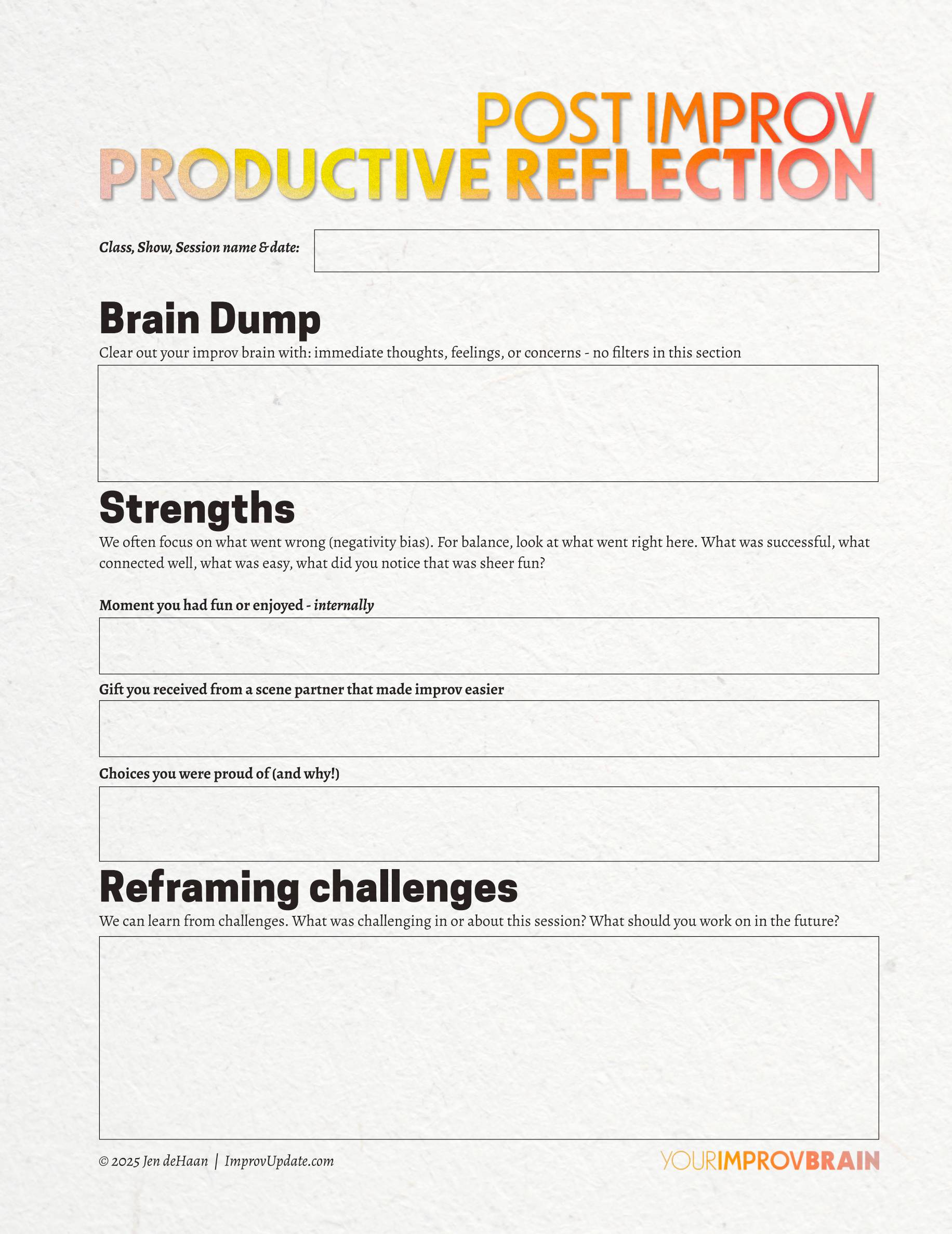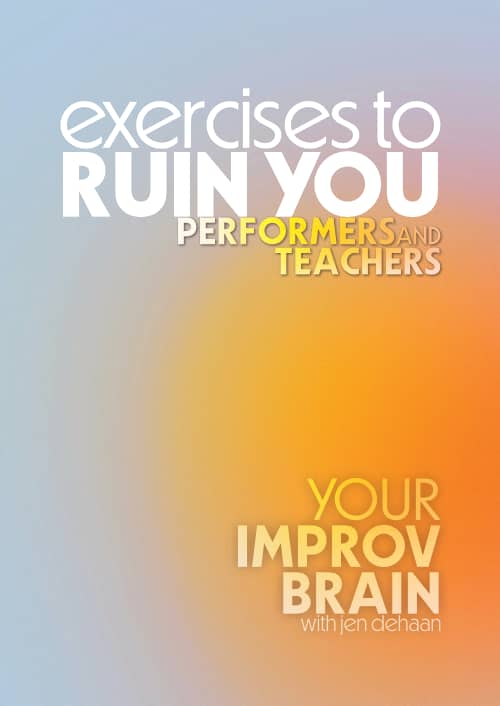|
Greetings improvisers!
I'm now adding a special more in-depth focus on neurodivergent minds in the newsletter about topics I have in the weekly episodes of Your Improv Brain. And only in here.
So we start out this week about inner critics and the neurodivergent performer.
I always encourage statistically-dominant neurotypes (aka "neurotypical") to check these resources out. They might even be MORE helpful to you as an improviser. Remember that we are quite likely on every team, but certainly in every class and theater. In order to perform with or teach us effectively, knowing how we do improv can only help you do your work better.
Which is, like, why I started this thing in the first place. So if you think someone should be getting this info, feel free to forward this newsletter to them!
Free Worksheet
I just uploaded a free worksheet you can use to productively reflect after an improv session (practice, class, show, etc). Here it is, and I'll leave it linked in the footer of each newsletter, too.
You can print it out, and I added input text fields to this so you can keep it all digital if you prefer.
 |
$0.00
Post Improv Productive Reflection
A two page worksheet to help you reflect on any improv session. Focus on what your strengths and challenges are, and... Read more |
3-Step System & Exercise to Manage Self-Criticism in Improv
That voice in our heads, the inner critic, can be pretty relentless during improv scenes and sets. It might be telling you your idea was bad, or you're not being funny enough. Maybe that you just ruined the scene or show. For a long time, I thought the only way to deal with this voice was to squash it, but that's kinda hard. But then I wondered... can we actually use it?
Inner critics are part of our brain's wiring that tries to keep us safe from what it perceives as social threats. And performing in front of others, perhaps feeling unprepared and vulnerable, definitely qualifies. Once we understand that the critic is trying to help, or at least just do what it's there for (even if its methods are unhelpful for improv), we can start to work with it.
One way is to give that anxious energy a new home, such as by giving it to your character (let your character be the one who is worried or scared). The feeling is real, so the performance authentic.
You can also give that inner voice a specific, productive job to do. Before a show or class, decide on one small thing you want to work on, like making stronger physical choices. This gives that analytical part of your brain something useful to track instead of just yelling about everything at once.
But a really good way to channel this energy is to push it outward. In a specific way, not critiquing others. When you feel stuck in your head, become relentlessly curious about your scene partner. Listen with everything you have. Find an exercise I love for this in this week's episode that makes your partner look great. They do the same for you... so the inner critic becomes useful ("adaptive") instead of "maladaptive".
Neurodivergent Minds and the Inner Critic
For many of us with ADHD or autistic brains, the inner critic can be a constant, overwhelming broadcast... channel. That fear of social rejection is often a real, lived experience for us, which can make us pretty sensitive to it, because it's reality.
The idea of giving the anxious energy to your character can be particularly effective for some of us, or at least it has proven useful for me at times when I wasn't sure what to do with it. Many of our neurodivergent brains feel emotions with great intensity (even if we sometimes can't name them for a day or three!). Instead of trying to mask or suppress that feeling, which is exhausting, this technique lets us use it. That feeling becomes a part of the art, a valid and useful tool, rather than a personal failing we need to hide.
And remember, it doesn't need to be for a full show. Often that one scene, or even just the top of it, can be enough to move past whatever feeling is getting in the way.
You can often unmask safely within the context of a character. Similarly, giving the inner critic a specific job is a strategy for managing executive function challenges. An ADHD brain can be overwhelmed by trying to track everything at once. By narrowing the focus to one single, concrete goal (like "I will initiate with a physical choice") we provide that structure needed for our brain to succeed. The overwhelm becomes manageable.
Perhaps the most useful tool is the exercise in radical support I mentioned in the episode. For us autistic people, it can sometimes be difficult to navigate the subtle, intuitive flow of a scene. This exercise simplifies the goal: your only job is to agree with your partner and build. It removes the pressure of trying to guess the "right" thing to do. Focus on listening to them, and making those connections. It's active and concrete.
For an ADHD brain, the exercise forces a shift from a distracting internal monologue to a external focus (like, a productive kind of hyperfocus!) It trains the brain to find the most interesting thing in the room and pour all our attention to that one thing... our scene partner.
These are methods honouring how our brains actually work instead of "trying to fix them" which we don't need and would be pointless anyway. We are not a problem to fix. We are something to accept, as we are, because we are valid in the performance AS WE ARE.
Potential challenges, like intense emotions and analytical thinking, are great assets in any performance, on any team, in any community.
Listen or Watch

Six Exercises to Ruin You!
In a recent episode, Fail More to Learn More (Plus 7 Hacks to Help), I talked about the idea that the path to getting good at improv to rack up ten thousand "failures" instead of trying to avoid these "mistakes".
But how do you actually practice something like that? It is one thing to accept a mistake when it happens by accident or use something to "get out of it", but it is another to intentionally put yourself in a position to fail. To practice it, repeatedly. Yikes.
To help with this, I have put together a kind of workout plan with exercises designed to do just that. AND made an exercise book with additional help and tips.
 |
$5.00
Exercises to Ruin You
Six exercises (for scene partners or solo practice) to practice your biggest challenges. These include examples,... Read more |
Watch or Listen

Have a most excellent remainder of your week! Does anyone want a random fact about marshmallows next week? Let me know!
Take it easy,
Jen.
| 